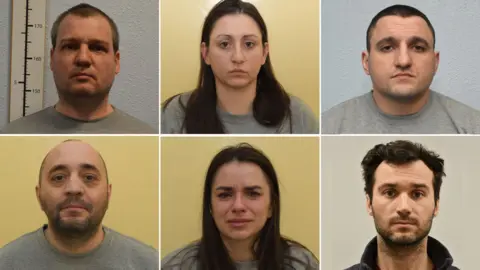In a significant legal ruling, six Bulgarian nationals have been sentenced to extended prison terms for their roles in a high-profile espionage operation on behalf of the Russian government. The developments unfolded during a trial at the Old Bailey in London, where prosecutors laid bare the extensive activities of the group, revealing that they were well-compensated for spying efforts across the UK and Europe. Their operations included surveillance on key journalists, among others, who had exposed covert actions by the Russian state involving nerve agent attacks on dissidents such as Alexei Navalny and Sergei Skripal.
The court proceedings shed light on the gravity of the group’s actions, which were deemed to pose a serious risk to national security within the UK. The ringleader, Orlin Roussev, received a sentence of 10 years and eight months. His second-in-command, Biser Dzhambazov, was sentenced to a similar period of 10 years and two months. Additionally, Katrin Ivanova, Roussev’s former partner, was sentenced to nine years and eight months for her involvement in the espionage activities.
The other members of the group, namely Tihomir Ivanchev, Ivan Stoyanov, and Vanya Gaberova, received sentences ranging from six to eight years. Interestingly, not all defendants entered guilty pleas, with Roussev, Dzhambazov, and Stoyanov admitting their guilt while the remaining members were found guilty following a trial in March. The extensive nature of the group’s operations spanned various countries, including Austria, Spain, Germany, and Montenegro.
During the trial, the prosecution detailed how the group targeted not only journalists, specifically naming Christo Grozev and Roman Dobrokhotov, but also Russian political dissidents and Ukrainian military personnel. The espionage activities were characterized as one of the largest foreign operations conducted in the UK, striking at the core of national security interests. For the first time in a UK court, evidence from the operational framework of a Russian spy cell was presented, including thousands of organized messages, details of surveillance assignments, and discussions of potential kidnapping and assassination plots.
Moreover, the case introduced Jan Marsalek, an Austrian fugitive tied to the Russian intelligence framework, who reportedly directed the operations of the spy ring while currently wanted for unrelated fraud charges in Germany. The group labeled themselves in a tongue-in-cheek fashion as the “minions,” a reference to the animated characters from the “Despicable Me” franchise, illustrating the absurdity sometimes associated with their serious criminal undertakings. They utilized technology to aid their efforts, and police discovered a plethora of espionage equipment, including a Minion plush toy embedded with a camera during a raid in Norfolk in 2023.
Judge Nicholas Hilliard, during the conclusion of the sentencing, emphasized the severity of using the UK as a base for planning espionage operations, indicating such acts undermine the country’s standing within the international community. The judge highlighted that targeting journalists directly threatens freedom of the press—one of the foundational principles of democracy.
The Russian Embassy in London has yet to comment on this case, consistent with the Kremlin’s historical denial of allegations regarding espionage activities. The maximum potential punishment for conspiracy to conduct espionage is 14 years; however, the court considered the guilty pleas of Roussev, Dzhambazov, and Stoyanov when determining their sentences. Notably, Roussev was instructed to surrender a confiscation order of £180,768 by August 2025.
In the aftermath of the verdict, officials from the Metropolitan Police emphasized the case as a stark illustration of the evolving threat posed by state-sponsored espionage, asserting that illicit operations can now be outsourced by nations seeking to further their geopolitical agendas. The Security Minister underlined the significance of the substantial sentences issued, declaring they should act as a deterrent to those considering threats against UK security and the general safety of its population.



